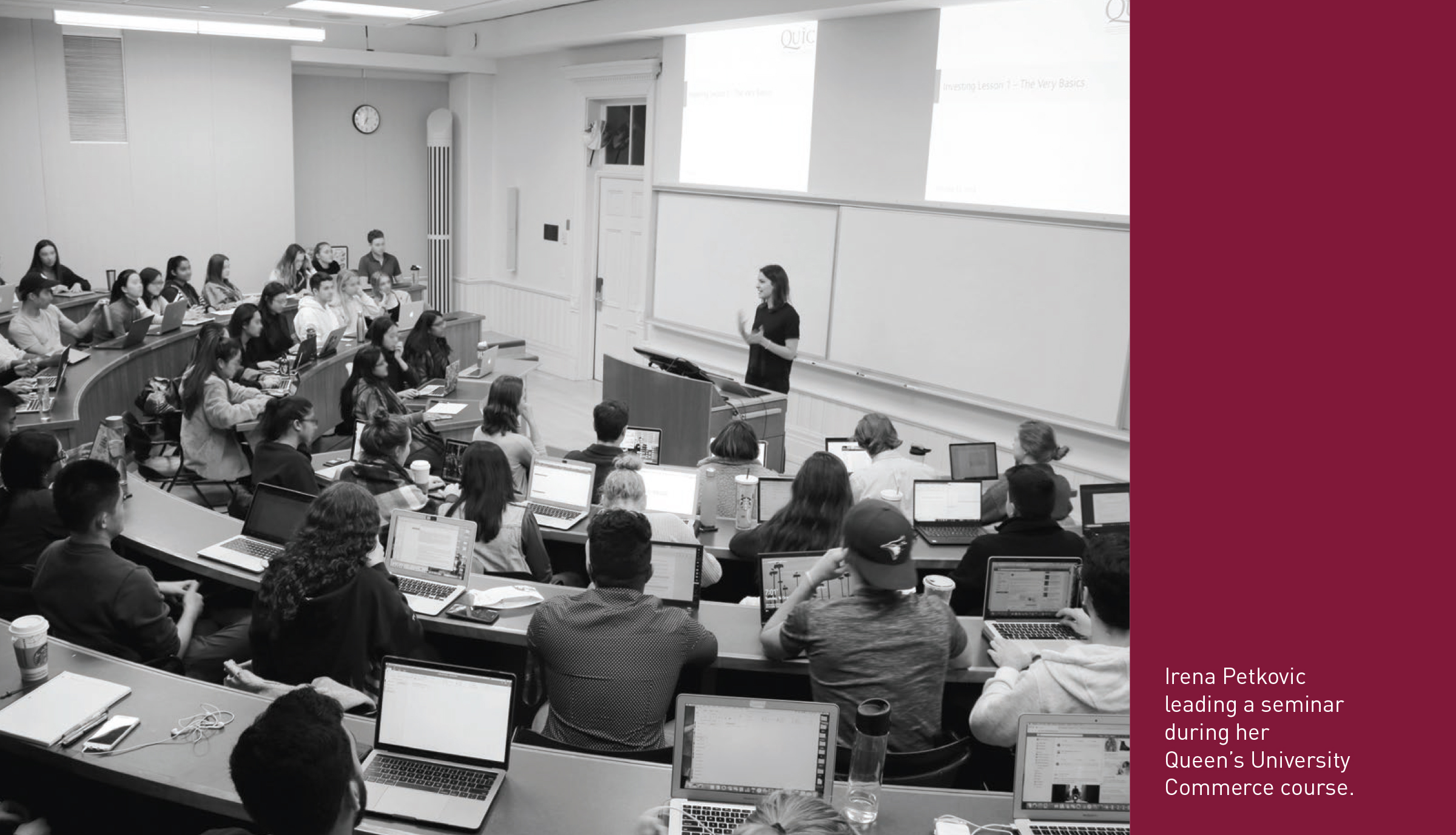Irena is currently in her fourth year in the Queen’s University Commerce program, and serves as Chief Strategy Officer of the Queen’s University Investment Counsel (QUIC), a student-run investment club that manages part of the Queen’s University Endowment. At Queen’s, Irena spearheaded a Women’s Investing Initiative to empower women to pursue careers in investing. Upon graduation, Irena is excited to be joining Burgundy Asset Management in Toronto as an Investment Analyst for the Canadian Small Cap Team. Irena spent her past two summers at Burgundy, rotating between the Canadian Small Cap Team, the European Team and the Canadian Large Cap Team.
Robyn Ross: When was the first time you thought about working in finance?
Irena Petkovic: I came into business school mostly through a process of elimination: I didn’t like the rigidity of sciences, but I still enjoyed math, so business seemed like a good balance. My mother worked in a finance firm, so the industry was introduced to me that way, but I didn’t consider working in finance until I came to Commerce. The two main streams were really finance or consulting, both of which seemed extremely abstract at the time, but I felt that finance was a better balance of qualitative and quantitative analysis, so I started joining finance clubs. From there, it was almost assumed that I would become an investment banker, which seemed to be the only career option available for people who wanted to work in finance.
RR: How did you move from a broad focus on finance to a more targeted goal of working in value investing?
IP: I was introduced to investing in first year when I joined the Queen’s University Investment Counsel, which is a student-run club that invests a portion of the school’s endowment. My main motivation in joining the club was not to become a great investor, but to pursue an excellent learning opportunity. I came to recognize that the real opportunity in being a QUIC member was learning about business and strategy.
I came to value investing very unintentionally. I contacted Burgundy in my second year—I knew there were a lot of smart people there, and that they were true value investors. I saw my summer internship as a learning opportunity, but never considered it a career—it wasn’t until a few weeks into my summer that I noticed how much I looked forward to coming to work every morning, and I really felt in my gut that this was what I wanted to do.
What was the most alarming to me was how anxious I felt about the prospect of doing anything else. I started to seek out opportunities for my next summer based on what would allow me to return to Burgundy one day. It took me a few weeks to realize that if I knew that this is what I wanted to do right away, I should just ask.
This internship experience has come full circle, in that now I’ve been able to use what I have learned to augment QUIC’s investment philosophy and education program.
RR: What and who were the influences in your life that have shaped your success thus far?
IP: I owe a lot to my parents, who instilled in me the conviction that learning is not something that begins and ends in the classroom. They always urged me to go beyond what was required, to understand different perspectives and explore alternative strategies. Because of them, I came to regard knowledge as a function of effort and curiosity. I believed that I could learn about anything, and actually enjoy the learning process, not be stressed by it. I find investing enjoyable because it requires that same combination of curiosity and drive to learn —you’re always asking, “Is this it? How can I look at this differently?”
They also taught me to work hard and be humble through example. This really taught me that “achievement” was not the result of things that happened to you or accomplishments, but rather a state of constant self-improvement.
RR: What do you think are some barriers for women entering finance?
IP: One is a lack of awareness, another is the perception that women are inherently “behind” or less capable when it comes to studying or pursuing a career in finance. From what I’ve seen, both misconceptions start in university, if not earlier in their education—well before women enter the workforce. Students often perceive finance as a black box, an industry often characterized (or mischaracterized) by media as rowdy, cut-throat and a boys’ club. That image may not be as off-putting to young men looking at a career in finance, but it can certainly be a deterrent to women.
RR: What has been your greatest lesson so far?
IP: There’s a Marcus Aurelius quote that summarizes it more elegantly than I can: “Never let the future disturb you. You will meet it, if you have to, with the same weapons of reason which today arm you against the present.” It’s the idea that things will work out in the end, not because of fate or destiny, but because if it doesn’t you are capable of learning how to get better, and fix it. This subtle shift has really allowed me to take more risks and do things more wholeheartedly.
RR: What have you had to overcome?
IP: Being surrounded by investors who are masters in their field can be intimidating. Sometimes during my internship I would catch myself wondering if my peers would value my ideas. What I’ve learned is that I can control the effort and research I put into my work. It’s more productive to pursue better processes, higher quality analyses and greater knowledge, and not spend time wondering what other people think.
Choosing to work in asset management full time was also my first experience in going against the crowd. It was the first time that I had done something drastically different than my peers, and it was very uncomfortable. I had to overcome the fear of being different. I anchored myself in my own reasoning and analysis, and the satisfaction I felt from my two summers at Burgundy.
RR: What advice do you have for young women as they choose a career path?
IP: Do as much research and talk to as many people as you can when making your choices. Be skeptical of conventional wisdom. Have the courage to ask, “Is this really what I want? Do I even understand enough about what this job is to know if I want it?” and then have the courage to act on the answer. You can root your courage in the fact that you’ve done your research, and now you can be deliberate about your choices, even if those mean going against the grain.

This publication is presented for illustrative and discussion purposes only. It is not intended to provide investment advice and does not consider unique objectives, constraints or financial needs. It is not intended as an offer to invest in any Burgundy investment strategies. Under no circumstances does this publication suggest that you should time the market in any way or make investment decisions based on the content. Select securities may be used as examples to illustrate Burgundy’s investment philosophy. Research used to formulate opinions was obtained from various sources and Burgundy does not guarantee its accuracy. Forward looking statements are based on historical events and trends and may differ from actual results. Any inclusion of third party books, articles, and opinions does not imply Burgundy’s endorsement or affiliation. The information in this publication is as of the date of the publication and will not be revised or updated to reflect new events or circumstances.

